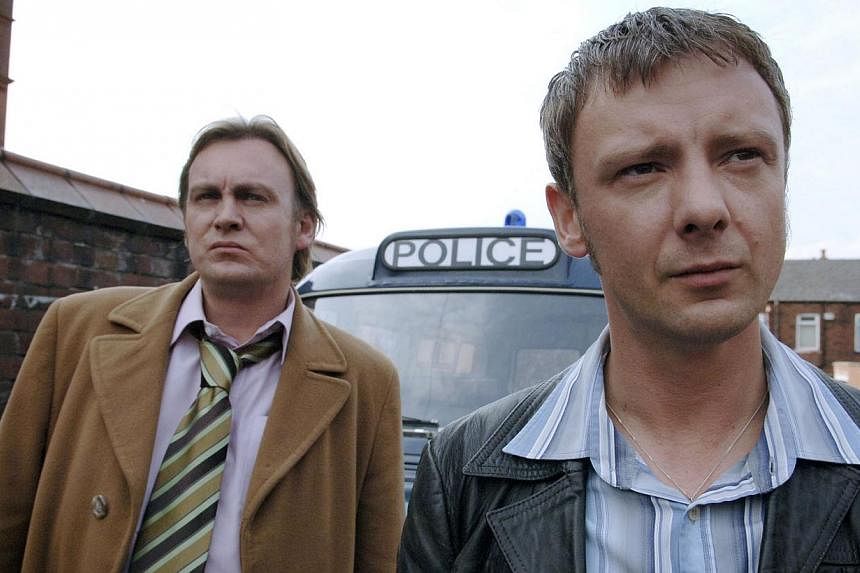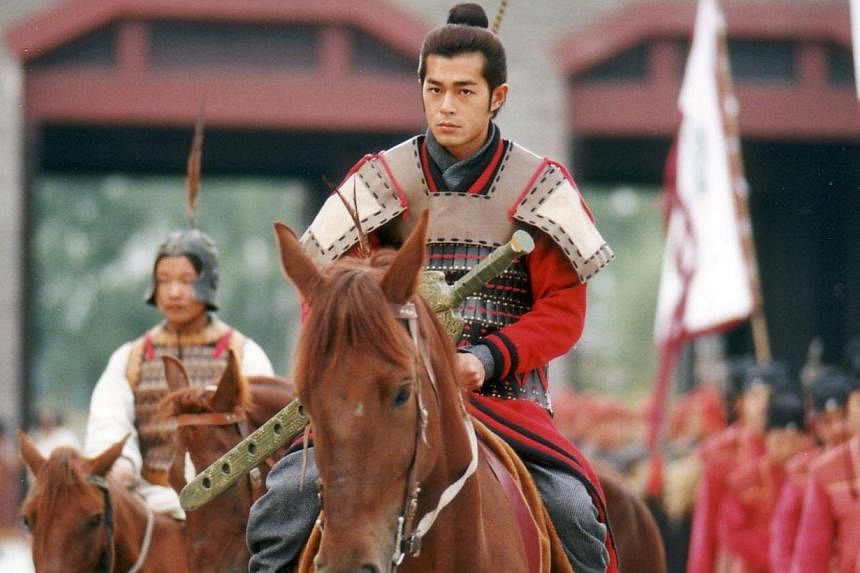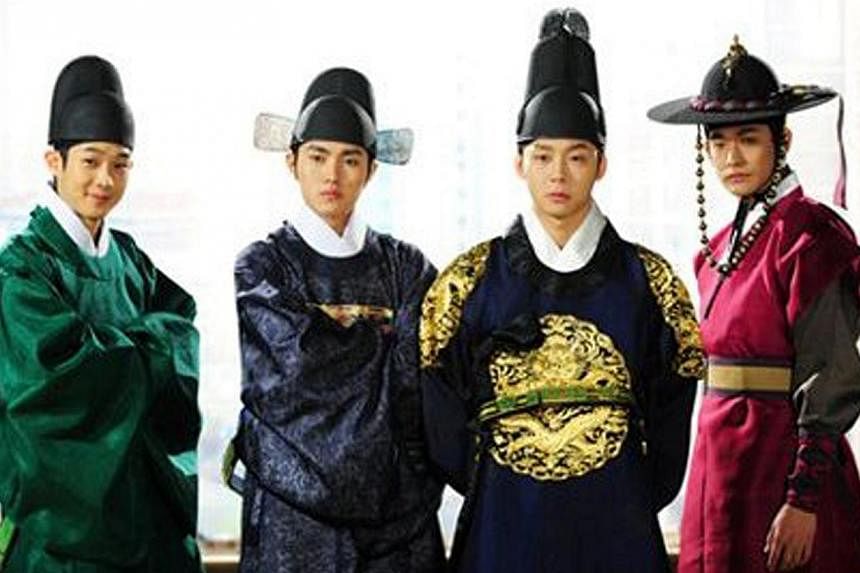Whether it is to undo a wrong or to go into the future to find out what is in store for you or your loved ones, the ability to travel through time is something that has long been a subject of fascination for TV producers and film-makers.
In recent years, Asian TV drama writers in particular seem to be especially intrigued by the subject, as a whole host of shows centred on the concept have come out of South Korea, China and Hong Kong.
In 2012 alone, South Korea had at least five different dramas that made use of the notion of time travel - from the popular comedy Rooftop Prince, about four men from the ancient Joseon era who appear in modern-day Seoul, to the medical drama Dr Jin, starring Song Seung Heon as a gifted neurosurgeon who suddenly gets transported back to the year 1860.
Singapore has jumped on the time-travel bandwagon recently with the new MediaCorp drama Blessings, which is now showing on Channel 8.
In the series, Shaun Chen plays a man who travels from 1940s Singapore to the present, where he is hoping to revive his once-famed traditional tau sar piah pastry shop, which is facing market pressures to close down.
Executive producer of the show Jasmine Woo says the idea behind incorporating time travel here is so the drama can introduce some old traditions to younger audiences.
She tells Life! in a telephone interview: "There are a lot of time-travel shows out there recently, but for us, the central idea is all about traditions. We really want to highlight how values in Singapore have changed over the years.
"For example, Shaun Chen's character is shocked that in the present, Chinese families no longer have the habit of greeting elders before they eat at the dinner table. And he is confused as to why many Singaporean Chinese kids have English names.
"To have this man with these 1940s values live in the present, the contrast in values of the different time periods is more obvious than if he were just a father being shocked by his son."
Nanyang Technological University assistant professor Liew Kai Khiun agrees that the idea of time travel often serves to play up contrasts.
Says the lecturer, who has research interests in Asian pop culture: "Aside from the humorous moments in these encounters between the old and new in fashion, technology and customs, the critical component of this genre lies in the tensions between modern individualism - especially in the pursuit of romance and happiness - and the traditional obligations of feudal kinship.
"Audiences would also expect to watch the clash between antiquated stoicism and modern openness as well as privileged royalty of the past against independent citizens of the present."
Perhaps the fact that time-travel dramas have remained so popular among audiences is a little ironic given that most of them are riddled with scientific loopholes.
Much has been written about theories such as the famous Grandfather Paradox (the notion that it is impossible to go back in time to kill an ancestor because otherwise you would not be born at all) and the Butterfly Effect (the idea that making even the tiniest change to something in history would change everything else that follows).
But TV fans such as Ms Theresa Khong, 29, are happy to cast aside such niggling technicalities to simply enjoy the entertaining stories of time-travel shows.
The financial analyst names China's mega-hit time-travel show Scarlet Heart (2010 - 2011) and British mini-series Lost In Austen (2008) as her favourites.
She says: "Time-travel shows are fun to watch because you know there is always going to be some sort of conflict between how people behave in one time period and those in other time periods.
"Often, the hero is also a lot more romantic if he came from an older time because people then were generally required to be more courteous. In Lost In Austen, when 21st-century girl Amanda goes back in time to meet Mr Darcy, she is of course easily wowed by him because, unlike her modern-day boyfriend, he is a true gentleman. That's also why girls loved the movie Kate & Leopold (2001) so much - Hugh Jackman's 19th-century duke character was so dapper."
Prof Liew picks Hong Kong TVB drama The King Of Yesterday And Tomorrow (2003) as the one time-travel series he enjoyed the most.
Of the series about an 18th-century emperor who becomes a cleaner overnight in contemporary Hong Kong, he says: "Buttressing the excellent cast of veterans that include Kwong Wa and Maggie Cheung Ho Yee was an entertaining and sober script that showed how even the high and mighty have to struggle to get back on their feet when they are brought down to earth overnight."
For many viewers then, whether any of these time-travel shows are actually plausible is hardly the point. The thing that matters, really, is whether new shows are able to come up with fresh, original ideas and concepts regarding time travel.
The story, truly, is king - then and now.
Follow Yip Wai Yee on Twitter@STyipwaiyee
Blessings airs on Channel 8 on weeknights at 9pm.
SOUTH KOREA
ROOFTOP PRINCE (2012)
What: A Joseon dynasty prince (Park Yoo Chun, second from right) and his three minders travel from ancient palace times to modern-day Seoul after horseriding off a cliff during a lunar eclipse, where they are determined to solve the mysterious murder of his wife. He soon falls in love with a feisty modern girl named Park Ha (Han Ji Min).
The romance-comedy was hugely popular with viewers across Asia and won several major awards including Best Korean Drama and Outstanding Korean Actor and Actress for Park and Han at the Seoul International Drama Awards.
What fans say: Communications officer Nicole Lee, 27, found the fish-out-ofwater time-travel concept here "very, very funny", adding that she "loved the scene in which the four men have to deal with modern-day money for the first time in a supermarket". Ms Lee, who adds that she "suffered from withdrawal symptoms after the show ended", says she found the show "very romantic because the main couple are fated to be together, even though they get to know each other in different time periods".
DR. JIN (2012)
What: In this medical drama loosely based on the Japanese manga Jin, heart-throb Song Seung Heon plays a neurosurgeon who, after removing a curious foetus-shaped tumour which somehow sends him back 150 years, suddenly finds himself in the Joseon era when medical knowledge was still rudimentary. There, he has to improvise with available materials to suit his modern-day knowledge and develop his own medical treatments, but he also faces the difficult decision of how much knowledge he should share before it changes history.
What fans say: Product planner Zarah Nasarudin, 32, enjoyed the "unique science fiction-meets-medical drama story" but admits that the time-travel concept soon became "too complicated".
She adds: "Still, I think it's one of the standout time-travel K-dramas because it takes itself seriously and is so different from many of the other time-travel shows which came out around the same time, which were generally all silly comedies."
NINE: NINE TIME TRAVELS (2013)
What: A man (Lee Jin Wook) discovers nine magical incense sticks, each of which allows him to travel back in time exactly 20 years to the day for the half-hour that it burns. While in the past, he hopes to solve a crime and avenge his family, but soon realises that every action of his affects the lives of everyone living in the present, including that of his own - sometimes for the worse.
What fans say: Communications officer Lee says she found the time-travel concept intriguing because it got her thinking about whether changing history is worth it if it may alter the future for the worse.
"Jin Wook's character has nine chances to travel in time and, each time, he makes things even more complicated and dangerous for himself and his family than before. I definitely don't wish to have any of these magical incense sticks - maybe we should just accept our past."
GOD'S GIFT: 14 DAYS (2014)
What: A mother (Lee Bo Young) is distraught after her young daughter is kidnapped and murdered. When she jumps into the lake in which the police say her daughter is believed to have drowned, a mysterious power envelops her and sends her back in time to a fortnight before the murder. Working with a private investigator, she makes good use of the two weeks to try to stop the kidnap from taking place.
The show will re-run on One (StarHub TV Channel 820, SingTel mio TV Channel 513) on Sept 27 at 8.45pm.
What fans say: Product planner Zarah enjoyed the serious nature of this show, saying "my heart was beating hard with every episode cliffhanger, wondering if they would manage to solve the case within the limited time".
She adds: "For Lee's character, the stakes are so high - if she doesn't succeed, she knows that her daughter will be dead."
CHINA
SCARLET HEART (2010 - 2011)
What: This mega-hit has Liu Shishi playing a 21st-century woman who travels back in time to the Qing Dynasty after suffering a near-fatal accident. There, she falls in love with Prince Yinzhen (Nicky Wu) and gets embroiled in a complex web of palace intrigue.
The show, based on Tong Hua's serialised online novel Bubu Jingxin (2005), became hugely popular with viewers in China and throughout Asia. Fans were naturally delighted when news broke that show leads Wu and Liu are dating in real life.
A sequel starring the two and set in the modern day is now showing on Channel U at 10pm.
What fans say: Housewife Hsieh Ting-tai, 49, says the time-travel concept is "not very original" but "still very entertaining", adding that "it is fun throughout the series to see if Liu's character would ever want to return to her normal life back in the modern day, especially after she has experienced so much more excitement in ancient palace times".
HONG KONG
THREE KINGDOMS RPG (2012)
What: Kenneth Ma stars as a video-game addict who accidentally travels back in time after falling into a hole inside a cave. He ends up in the Three Kingdoms period in Chinese history, where he meets many figures from his favourite video game centred on that time period. He even assists Zhuge Liang (played by Raymond Lam) in strategising battles.
The show was a big success, drawing in an average of more than 2.2 million viewers in Hong Kong for each episode.
What fans say: Polytechnic student Tiffany Yeoh, 21, says the show accurately reflects how many people her age know anything about ancient Chinese history through video games and TV dramas. "The show is never serious and that's why it's good for some mindless entertainment. Kenneth Ma is funny as the silly 21st-century young man who often surprises his new historical-figure friends with his amazing war knowledge - all taken from video-game training."
A STEP INTO THE PAST (2001)
What: This highly rated TVB drama stars Louis Koo - before he became a top movie star - as an elite special agent who is sent back in time to the Warring States period as part of a secret time-travelling experiment. Using his 21st-century knowhow and skills, he becomes a valuable ally to many lords and noblemen of the time.
What fans say: Housewife Hsieh, who has watched this twice, says Koo is not known to be a funny guy but manages to be comical in this show, especially when he lands in the past and attempts their formal way of speaking.
She adds: "It's not a typical war drama either because the main character uses a lot of modern-day knowledge to help him in his battles, but that's what makes it enjoyable."
UNITED STATES
LOST (2004 - 2010)
What: This massively popular highconcept drama did not start out as a time-travel show, but the time-travel concept soon became an important recurring theme and was eventually the answer to many of the bizarre things happening to the survivors on the island.
Lost always stuck close to the time-travel rule that "whatever happened, happened", meaning there is no way anyone can ever change the course of history even if they manage to successfully travel back in time.
What fans say: University student Cho Junyang, 22, says time travel in Lost was "fascinating" and "thought-provoking" at first but soon became "overly complicated".
He adds: "I do like the idea of 'whatever happened, happened', though, because it means they are all fulfilling their destinies in some way. When Desmond (Henry Ian Cusick) envisioned that Charlie (Dominic Monaghan) would die, he kept trying to prevent it from happening but still failed to do so. It is sad but it also makes the show gripping."
FLASHFORWARD (2009 - 2010)
What: Based on the 1999 novel of the same name by Robert J. Sawyer, this drama is about what happens after a massive global event causes almost everyone to simultaneously lose consciousness for a while. During that blackout, many people could see visions of their own lives set six months from the present day.
What fans say: Student Cho found the show "very intriguing" because it gets audiences to think about whether it is really a positive thing to know the details of our future. "Sometimes, that kind of thing is better left unknown so you don't get paranoid about trying to alter it."
BRITAIN
DOCTOR WHO (1963 - PRESENT)
What: This long-running series is centred on the Doctor, someone who can travel through time in a special spaceship known as the Tardis, whose exterior looks like a police telephone box. He travels throughout history and space to help stop crime, battle injustice and save humanity.
Since its debut more than 50 years ago, the show has become an icon of British pop culture and gained a cult following around the world. So far, 11 different actors have taken on the role of the Doctor, who is able to regenerate his appearance; they include Matt Smith and David Tennant, with the latest being Peter Capaldi.
What fans say: Ms Hema Ganesan, a 29-year-old who works in advertising, has been watching Doctor Who since the character was portrayed by Tennant in 2005.
She says: "The show often looks very cheap and tacky for a sci-fi series, but that's part of the fun. The characters are wacky and it's always interesting to find out where the Doctor will go to next and whether he can really right the wrongs of certain situations at all. Don't think about whether any of the time travelling makes sense - it's just entertainment."
LIFE ON MARS (2006 - 2007)
What: Policeman Sam Tyler (John Simm) gets hit by a car in 2006 and awakens to find himself working for the police department in 1973. As he continues to solve crime in his new predicament, both he and the audience have to figure out whether he has indeed travelled through time, fallen into a coma or has simply gone bonkers.
The show received both critical and commercial acclaim, with the first season's finale getting an impressive 28 per cent audience share in Britain and snagging a Bafta nomination for Best Drama and Best Actor for Simm. An American remake was produced in 2008 starring Jason O'Mara.
What fans say: Ms Ganesan watched the British version of the show and enjoyed how Tyler would look at his new environment through "nostalgic 1970s goggles".
She adds: "Life On Mars' use of time travel is all the more fascinating because you never really know if he is actually imagining it all and just dreaming the whole thing. The psychological impact of that for Sam makes the show rather haunting."







